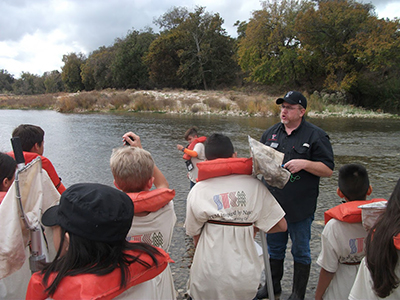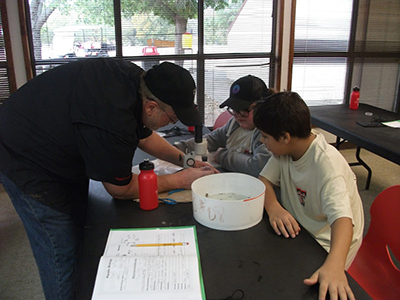Science Teacher Uses Natural World to Motivate, Engage Students
By Leslie Cranford, Section Manager

Mosley and his students study the water quality of the South Llano River, considering factors like pH, effects of temperature, and the life that call the river home.

Mosley and his students study the water quality of the South Llano River, considering
factors like pH, effects of temperature, and the life that call the river home.
It was in his own middle school days that TTU K‑12 science instructor Brett Mosley became interested – really interested – in learning.
“It was in part to some great teachers that gave me insight to how the world works and developing a natural curiosity of my environment,” Mosley said. “I have always wanted to inspire young people to also expand their own interest into the world around them.”
Mosley has been in education in one form or another since 2005. He was a classroom teacher for eight of those years, and he is in his second year with TTU K‑12, teaching Physics and Integrated Physics and Chemistry (IPC). He has taught earth science, biology, and chemistry in addition to physics and IPC.
“I was offered a position with the Texas Tech Outdoor Learning Center in Junction, and as part of those responsibilities I was given the opportunity to also teach a physics, and soon IPC, course with TTU K‑12,” he explained. “Being my first experience with online teaching, I was a little apprehensive. As I became familiar with Blackboard and got to interact with the students, the apprehension quickly went away.”
Mosley says the things that motivated him to become a teacher, like working with diverse and brilliant young people, are certainly still found in his online courses.

Mosley helps students identify macroinvertebrates with samples collected from the South Llano river.

Mosley helps students identify macroinvertebrates with samples collected from the
South Llano river.
“Being involved in the successes of our students and feeling I am a part of their increasing scientific literacy is an unmeasurable benefit of this job. Through TTU K‑12 I have had the opportunity to interact and teach some exceptional young people. Each student that enrolls in my courses comes to me with an interesting and unique background. I enjoy learning about them and seeing them develop throughout the semester.”
He admits, though, that some of the sciences are particularly challenging in an online setting. He says because physics is such a visual course, he finds it a challenge to help students understand the topic. In the classroom, he says the student can experience the phenomena as it relates to a topic.
“Videos and multimedia are not always the best routes in helping a student make those real-world connections. To overcome this, I try to relate the topic to something the student is doing,” he explained. “A cross country runner experiences acceleration and velocity every race they run. A singer experiences sound waves and resonance every time they perform. I look to use their experiences to make the physics more relatable.”
Mosley says his goal as a teacher has always been to help students become critical thinkers and be more engaged in the why and how of the natural world. He points out many aspects in classical physics that people experience in their lives that are taken for granted, from hitting a golf ball to driving a car to maybe even space travel in the not-so-distant future.
Finally, Mosley's word of advice to any student is to look at learning as a pleasure instead of a chore.
“There are more opportunities now in how we learn, what we want to study, and the amount of information available to us that it is an exciting time to be a student. I hope to instill in my students a lifelong enjoyment of learning and inquisitiveness built on a strong foundation of the sciences.”
To TTU K‑12 students particularly, he recommends making a schedule.
“Don't wait until the end of your course to try to do it all. And ask your teachers for help when you have questions – we like helping you!”
Texas Tech K-12
-
Address
Texas Tech Plaza | 1901 University Ave, Lubbock, TX 79401 -
Phone
(800) 692-6877 -
Email
ttuk12@ttu.edu
